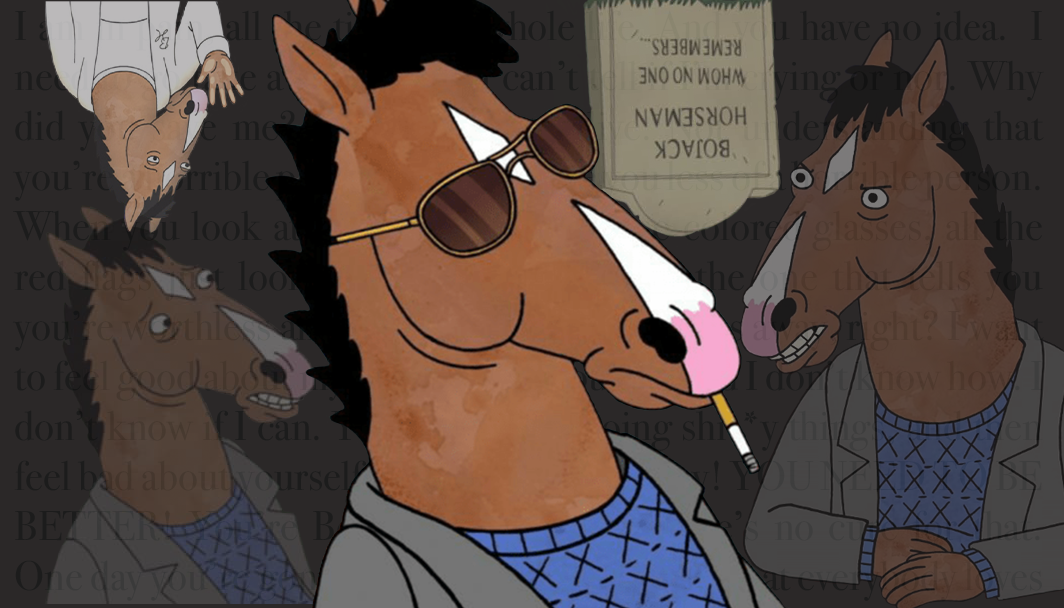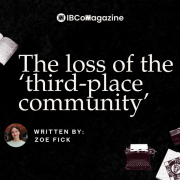BoJack Horseman is a cinematic masterpiece that can make you cry in one scene, and laugh in another. Despite literally being about cartoon animals, it is one of the most touching, well-written looks at mental illness, self-indulgence, addiction, and suicide I have ever seen.
It is an animated show that takes place in an exaggerated version of Hollywood, where half of the characters are human and half of them are animated animals. The plot doesn’t seem to make any sense at all, but this surface-silly cartoon feel allows the show to dig into some deep, dark issues that feel authentic and weirdly relatable. As creator Raphael Bob-Waksberg puts it: ‘The brighter, the sillier and the cartoonier we went, the more the audience was willing to go with us to these melancholy places that may be on a live-action show would have come off as indulgent or saccharine’.
The main storyline follows BoJack who is a burnout 90s-sitcom actor. He used to be very famous back in the day, but he feels like his life has already had its peak. Now he lives alone in a Hollywood mansion, struggling with alcoholism, depression, meaningless hookups, and tries to find the purpose in his life again. As such, the show focuses more on what happens after the exciting parts of your life, as every story has the day after the “happy ending” day, and the day after that.
Throughout the series, BoJack appears to be a very rigid individual who constantly keeps people at his arm’s length. Because of his self-hatred mentality, BoJack often uses it as an excuse for treating his friends poorly, taking them for granted, and hurting them. After all, a person who is in pain can rarely feel other people’s emotions apart from himself.
At the onset, it seems that the show would be another classic story of the male anti-hero character, who is a terrible, self-centered person. But through the power of love and the women in his life, he redeems himself, becomes a good person, and thus lives “happily ever and after”. BoJack, however, subverts this perception. You do, at times, have sympathy for the main character, but as the series goes on, you also have to question whether he is a good person and, to what extent, are his actions excusable or unjustifiable.
That being said, it raises the concern: Should we normalize the idea of showing our flawed personality since it is more relatable to people?
At the beginning of the show, BoJack decides to hire a ghostwriter for his autobiography. The memoir eventually receives many positive reactions from the readers because of its rawness and relatability. Nonetheless, even though the message of accepting your flawed self seems empowering, it is constantly clung on as an excuse for BoJack’s later toxic mentality and wrongdoings.
At some point in our life, I guess some of us can relate well with BoJack. We may have gone off the deep end, struggling to stay afloat for the present. However, that should not be the reason for normalizing this toxic mentality, since it may also come at the cost of losing the loved ones in your life. In fact, this consequence is also emphasized in the final episode: Nice while it lasted. With or without the forgiveness of people, life keeps moving. The ending, therefore, left some people unhappy because they didn’t get to see the ‘happy’ ending motif, but BoJack actually has to endure his consequences from traces of mistakes and mistreatments he has hurt and done to people in the past.
It is interesting to notice that rather than letting BoJack die in the last season, the show writers still keep him alive (after his overdose) to face his consequences. Moreover, if he is dead, he won’t have the opportunity to become a better person and be fixed with the idea that his ugly sides are genetically inherited from the lackadaisical parenting style. Hence, the show ends with a bittersweet outlook on life; that is, as challenging as life can be, there is still hope at the end of the tunnel.
Author: Quynh Trang Le
Editor: Phoebe Elliott
Visuals by: Gabi Olenicz


